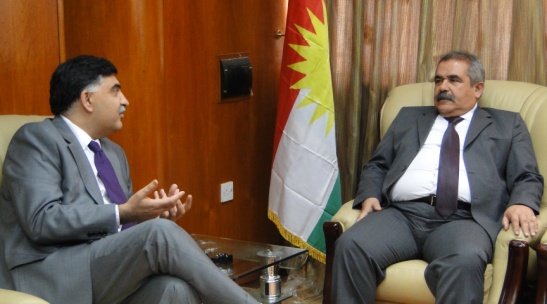 "When disasters strike or accidents occur, hospitals and healthcare centers should be a sanctuary where victims and patients can be brought to safety and accorded the best treatment possible to aid in the healing and recovery process," highlighted His Excellency the Minister of Health in Kurdistan region.
"When disasters strike or accidents occur, hospitals and healthcare centers should be a sanctuary where victims and patients can be brought to safety and accorded the best treatment possible to aid in the healing and recovery process," highlighted His Excellency the Minister of Health in Kurdistan region.
Dr Taher A. Hawramy during a joint Ministry of Health-World Health Organization visit to the Erbil main emergency hospital to observe the quality of emergency services being provided. H.E. Dr Hawramy was accompanied by the WHO Representative for Iraq Dr Syed Jaffer Hussain as well as senior delegates from the Ministry of Health and WHO staff members from the Iraq country office and the WHO Regional Office for the Eastern Mediterranean.
"Improving the quality, efficiency and standards of Emergency Services is our main objective to reduce the health consequences of emergencies, crises and conflict situations," Dr Hussain said. It was highlighted that road traffic crashes rank as one of the leading causes of mortality in Iraq . Around 75,000 lives were lost during the period 1979 - 2005 due to road traffic crashes and around 4000 fatalities during the past ten years in the Kurdistan region among which 25% were under five years of age.
During the visit, H.E Dr Hawramy and Dr Hussain had the first-hand opportunity to visit patients who were admitted to the emergency hall, inspect the units in the hospital to assure the quality of services being provided and speak to staff in order to identity any needs or challenges being faced.
The visit was followed by a press conference where more than 12 national television channel representatives and journalists were present to field questions to both the Minister and WHO. H.E Dr Hawramy highlighted the importance of rapid high quality life-saving responses and Dr Jaffar stressed on the important role of the media in raising the awareness of the communities on safety measures with regards to road safety. Following this, the MOH-WHO delegation paid a visit to the Khan Zad Urgency Aid Center located in the highway linking Erbil to Salah-Al-Din. This center was built with the support of WHO and plays an important role as an emergency post in ensuring that specialized medical services can be provided to victims and patients in a rapid and responsive manner.
The Ministry of Health in collaboration with the World Health Organization and other partners is working on strengthening and equipping the health system in Iraq though supporting the improvement of quality of medical services at three levels: pre- hospital care, essential hospital care and rehabilitation services, in addition to establishing strong blood transfusion services that will provide adequate and safe blood to every person in need.
Strengthening emergency services will not only save lives but also reduce human suffering and preserve valuable economic assets,” Dr Hussain added.
PR efficient and responsive emergency services crucial in saving lives is Avilable in | English





